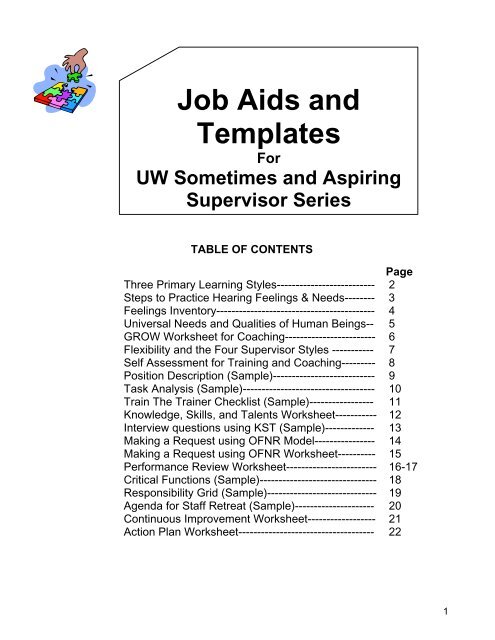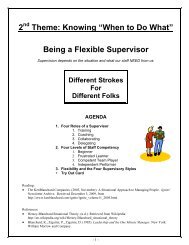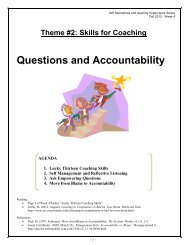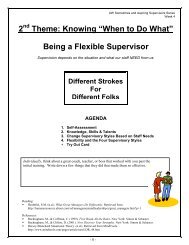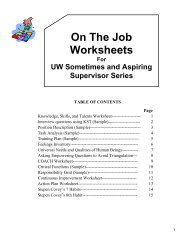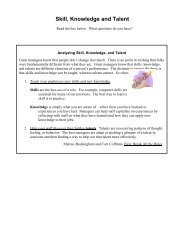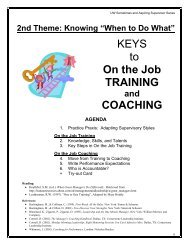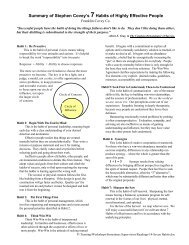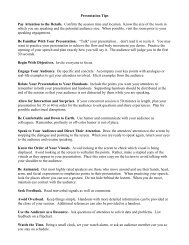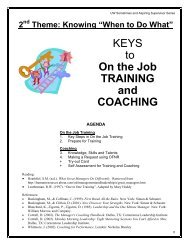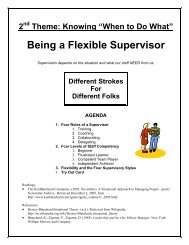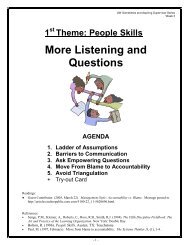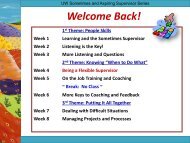Job Aids and Templates - Office of Human Resource Development
Job Aids and Templates - Office of Human Resource Development
Job Aids and Templates - Office of Human Resource Development
Create successful ePaper yourself
Turn your PDF publications into a flip-book with our unique Google optimized e-Paper software.
<strong>Job</strong> <strong>Aids</strong> <strong>and</strong><br />
<strong>Templates</strong><br />
For<br />
UW Sometimes <strong>and</strong> Aspiring<br />
Supervisor Series<br />
TABLE OF CONTENTS<br />
Page<br />
Three Primary Learning Styles-------------------------- 2<br />
Steps to Practice Hearing Feelings & Needs-------- 3<br />
Feelings Inventory------------------------------------------ 4<br />
Universal Needs <strong>and</strong> Qualities <strong>of</strong> <strong>Human</strong> Beings-- 5<br />
GROW Worksheet for Coaching------------------------ 6<br />
Flexibility <strong>and</strong> the Four Supervisor Styles ----------- 7<br />
Self Assessment for Training <strong>and</strong> Coaching--------- 8<br />
Position Description (Sample)--------------------------- 9<br />
Task Analysis (Sample)----------------------------------- 10<br />
Train The Trainer Checklist (Sample)----------------- 11<br />
Knowledge, Skills, <strong>and</strong> Talents Worksheet----------- 12<br />
Interview questions using KST (Sample)------------- 13<br />
Making a Request using OFNR Model---------------- 14<br />
Making a Request using OFNR Worksheet---------- 15<br />
Performance Review Worksheet------------------------ 16-17<br />
Critical Functions (Sample)------------------------------- 18<br />
Responsibility Grid (Sample)----------------------------- 19<br />
Agenda for Staff Retreat (Sample)--------------------- 20<br />
Continuous Improvement Worksheet------------------ 21<br />
Action Plan Worksheet------------------------------------ 22<br />
1
Three Primary Learning Styles<br />
Visual - Auditory - Kinesthetic<br />
Read the description <strong>of</strong> the three Learning Styles. Circle or underline what reminds you <strong>of</strong> yourself.<br />
VISUAL: Learning through seeing.<br />
Like to see pictures or diagrams.<br />
Like demonstrations <strong>and</strong> watching videos.<br />
Enjoy reading, watching television, going to movies. Would rather read than be read to.<br />
Remember people by sight, do not forget faces. Reveal emotions through facial<br />
expressions. Plan ahead, like to see overall big picture. Good recall <strong>and</strong> eye contact, prefer<br />
to be shown rather than told.<br />
"I SEE what you mean. I can PICTURE the equipment that we need."<br />
AUDITORY: Learning through hearing.<br />
Like to listen to debates, audiotapes,<br />
lectures, discussion <strong>and</strong> verbal instructions.<br />
Enjoy listening to radio, music, <strong>and</strong> debates, remember names, recall facts, have big<br />
vocabulary. Give verbal directions (go one block <strong>and</strong> turn left). Reveal emotions verbally<br />
through change in tone. Responds better when hearing information rather than reading.<br />
"That SOUNDS right. I HEAR you loud <strong>and</strong> clear."<br />
KINESTHETIC: Learning through doing. Like activities<br />
<strong>and</strong> direct involvement in tasks. Like to be "h<strong>and</strong>s-on,"<br />
moving, touching, <strong>and</strong> experiencing first h<strong>and</strong>.<br />
Enjoy active pursuits such as yoga, hiking, dancing, <strong>and</strong> biking. Remember things that<br />
happen. Give directions by leading the way. Reveal emotions through body language.<br />
Learn well by “getting in there <strong>and</strong> doing it”. Feel if something is right; rely on gut<br />
reaction.<br />
“The details are FALLING into place. It is starting to FEEL right.”<br />
2
Steps to Practice Hearing Feelings <strong>and</strong> Needs<br />
Before Making a Request<br />
1. TRIGGER! What are the exact words you heard that bothered you?<br />
Trigger<br />
2. STOP!<br />
3. BREATHE!<br />
4. LISTEN TO YOUR THOUGHTS: What’s going through your mind?<br />
Are you:<br />
Blaming or judging the other person?<br />
<br />
Blaming or judging yourself?<br />
5. PAY ATTENTION TO YOUR OWN FEELINGS AND NEEDS:<br />
• Yellow Cards/Feelings: Are you ____________?<br />
• Red Cards/Needs: Because you need ____________?<br />
• Allow time for person considering his/her feelings <strong>and</strong> needs time to reflect.<br />
6. WHAT MIGHT THE OTHER PERSON BE FEELING AND NEEDING?<br />
<br />
<br />
<br />
Yellow Cards/Feelings: I wonder if he/she is ____________.<br />
Red Cards/Needs: Because he/she needs ____________.<br />
Allow time for person considering the other’s feelings <strong>and</strong> needs time to reflect.<br />
7. CONSIDER WHAT YOU MIGHT SAY OR DO<br />
3
4<br />
FEELINGS INVENTORY<br />
Feelings when your needs are satisfied<br />
Affectionate<br />
compassionate<br />
friendly<br />
loving<br />
open hearted<br />
sympathetic<br />
tender<br />
warm<br />
Confident<br />
empowered<br />
open<br />
proud<br />
safe<br />
secure<br />
Engaged<br />
absorbed<br />
alert<br />
curious<br />
engrossed<br />
enchanted<br />
entranced<br />
fascinated<br />
interested<br />
intrigued<br />
involved<br />
spellbound<br />
stimulated<br />
Inspired<br />
amazed<br />
awed<br />
wonder<br />
Excited<br />
amazed<br />
animated<br />
ardent<br />
aroused<br />
astonished<br />
dazzled<br />
eager<br />
energetic<br />
enthusiastic<br />
giddy<br />
invigorated<br />
lively<br />
passionate<br />
surprised<br />
vibrant<br />
Exhilarated<br />
blissful<br />
ecstatic<br />
elated<br />
enthralled<br />
exuberant<br />
radiant<br />
rapturous<br />
thrilled<br />
Grateful<br />
appreciative<br />
moved<br />
thankful<br />
touched<br />
Hopeful<br />
expectant<br />
encouraged<br />
optimistic<br />
Joyful<br />
amused<br />
delighted<br />
glad<br />
happy<br />
jubilant<br />
pleased<br />
tickled<br />
Peaceful<br />
calm<br />
clear headed<br />
comfortable<br />
centered<br />
content<br />
fulfilled<br />
mellow<br />
quiet<br />
relaxed<br />
relieved<br />
satisfied<br />
serene<br />
still<br />
tranquil<br />
trusting<br />
Refreshed<br />
enlivened<br />
rejuvenated<br />
renewed<br />
rested<br />
restored<br />
revived<br />
Feelings when your needs are not satisfied<br />
Afraid<br />
apprehensive<br />
dread<br />
foreboding<br />
frightened<br />
mistrustful<br />
panicked<br />
petrified<br />
scared<br />
suspicious<br />
terrified<br />
wary<br />
worried<br />
Annoyed<br />
aggravated<br />
dismayed<br />
disgruntled<br />
displeased<br />
exasperated<br />
frustrated<br />
impatient<br />
irritated<br />
irked<br />
Angry<br />
enraged<br />
furious<br />
incensed<br />
indignant<br />
irate<br />
livid<br />
outraged<br />
resentful<br />
Aversion<br />
animosity<br />
appalled<br />
contempt<br />
disgusted<br />
dislike<br />
hate<br />
horrified<br />
hostile<br />
repulsed<br />
Confused<br />
ambivalent<br />
baffled<br />
bewildered<br />
dazed<br />
hesitant<br />
lost<br />
mystified<br />
perplexed<br />
puzzled<br />
torn<br />
Disconnected<br />
alienated<br />
alo<strong>of</strong><br />
apathetic<br />
bored<br />
cold<br />
detached<br />
distant<br />
distracted<br />
indifferent<br />
numb<br />
removed<br />
uninterested<br />
withdrawn<br />
Disquiet<br />
agitated<br />
alarmed<br />
discombobulated<br />
disconcerted<br />
disturbed<br />
perturbed<br />
rattled<br />
restless<br />
shocked<br />
startled<br />
surprised<br />
troubled<br />
turbulent<br />
turmoil<br />
uncomfortable<br />
uneasy<br />
unnerved<br />
unsettled<br />
upset<br />
Embarrassed<br />
ashamed<br />
chagrined<br />
flustered<br />
guilty<br />
mortified<br />
self-conscious<br />
Fatigue<br />
beat<br />
burnt out<br />
depleted<br />
exhausted<br />
lethargic<br />
listless<br />
sleepy<br />
tired<br />
weary<br />
worn out<br />
Pain<br />
agony<br />
anguished<br />
bereaved<br />
devastated<br />
grief<br />
heartbroken<br />
hurt<br />
lonely<br />
miserable<br />
regretful<br />
remorseful<br />
Sad<br />
depressed<br />
dejected<br />
despair<br />
despondent<br />
disappointed<br />
discouraged<br />
disheartened<br />
forlorn<br />
gloomy<br />
heavy hearted<br />
hopeless<br />
melancholy<br />
unhappy<br />
wretched<br />
Tense<br />
anxious<br />
cranky<br />
distressed<br />
distraught<br />
edgy<br />
fidgety<br />
frazzled<br />
irritable<br />
jittery<br />
nervous<br />
overwhelmed<br />
restless<br />
stressed out<br />
Vulnerable<br />
fragile<br />
guarded<br />
helpless<br />
insecure<br />
leery<br />
reserved<br />
sensitive<br />
shaky<br />
Yearning<br />
envious<br />
jealous<br />
longing<br />
nostalgic<br />
pining<br />
wistful<br />
(c) 2005 Center<br />
for Nonviolent<br />
Communication,<br />
www.cnvc.org<br />
Email:<br />
cnvc@cnvc.org,<br />
1.505.244.4041
Universal Needs or Qualities <strong>of</strong> <strong>Human</strong> Beings<br />
By Mary Kay Reinemann based on the work or Rosenberg, MaxNeef, Maslow et al.<br />
Sustenance:<br />
food, warmth, rest<br />
Safety/Security:<br />
Care, autonomy, support, compassion, dependability, trust, peace, hope<br />
Affection/Love:<br />
Respect, honesty, self-respect, sensuality, intimacy, care, support, compassion,<br />
trust, connection, nurturance, cooperation, privacy<br />
Underst<strong>and</strong>ing/Empathy<br />
Curiosity, honesty, clarity, empathy, hope, learning<br />
Participation/Community<br />
Humor, honesty, inclusion, support, compassion, mutuality, celebration,<br />
mourning, contribution<br />
Leisure/Recreation<br />
Tranquility, spontaneity, fun, beauty, rest, peace<br />
Creativity<br />
Curiosity, beauty, inspiration, competence, contribution, self-expression<br />
Meaning/Identity<br />
Self-esteem, integrity, competence, purpose, competence, consistency, values,<br />
order, peace, beauty, wisdom, inspiration, having value, belonging, connection,<br />
contribution, celebration<br />
Freedom/Autonomy<br />
Passion, integrity, choice, self-esteem<br />
5
GROW Worksheet for Coaching<br />
G<br />
What’s your GOAL? What’s your Goal for Today’s Coaching Session?<br />
Or in an ongoing coaching session, What have you done since our last session?<br />
R<br />
What’s the current REALITY (or situation)?<br />
State behaviors <strong>and</strong>/or exactly was said. No blame, no shame<br />
Beware <strong>of</strong> assuming any intentions for someone’s action<br />
What have you DONE so far?<br />
What’s getting in your way?<br />
Move from looking at the current reality as a problem or challenge,<br />
to looking at the opportunities<br />
O<br />
What are your OPTIONS? What could you do to move this situation ahead?<br />
Tell me a story about the BEST time you did _______________?<br />
What did you do? Who was involved? What values were/are important to you?<br />
What’s another “right answer?”<br />
What’s another “right answer?”<br />
W<br />
What WILL you do? By When?<br />
Homework <strong>and</strong> follow-up:<br />
<br />
<br />
<br />
.<br />
Adapted from John Whitmore, Coaching for Performance <strong>and</strong> Robert Bolton, People Skills.<br />
6
Flexibility <strong>and</strong> the Four Supervisory Styles<br />
“In the end, it’s up to the manager to adjust to the employee’s motivational needs, not for the<br />
employee to adjust to how that manager likes to motivate people.”<br />
On My Mind: Employee Motivation, by Steven Kline, www.pfonline.com<br />
Supervisor<br />
Train<br />
Clear Direction<br />
<strong>and</strong> supervision<br />
Coach<br />
Encouragement <strong>and</strong><br />
direction<br />
Collaborate<br />
Share<br />
responsibility<br />
Delegate<br />
Evaluate<br />
progress<br />
Staff<br />
Beginner<br />
Frustrated<br />
Learner<br />
Competent<br />
Team Player<br />
Star<br />
Performer<br />
Feelings<br />
Needs<br />
What Questions<br />
could we ask?<br />
7
Self-Assessment for Training <strong>and</strong> Coaching<br />
Individually,<br />
» Put yourself in the shoes <strong>of</strong> your staff members. Rate yourself 1 - 5 as your employees would if they<br />
were rating you on these activities.<br />
» Then select 3 or 4 areas to improve. (The results <strong>of</strong> this assessment are for your use only)<br />
1=Never 2=Rarely 3=Sometimes 4=Usually 5=Always Rating<br />
1 My boss gets out <strong>of</strong> his or her <strong>of</strong>fice, <strong>and</strong> spends time with us at our work sites.<br />
I could do<br />
even better<br />
2 My boss thinks <strong>and</strong> speaks positively <strong>and</strong> has a good attitude.<br />
3 My boss shares information with us.<br />
4 I can talk to my boss when I need to, <strong>and</strong> s/he really listens.<br />
5 I get individualized attention from my boss.<br />
6 My boss really knows my strengths.<br />
7 My work is structured such that I get to do the things I’m good at.<br />
8 If I really need help, my boss will get involved with my work.<br />
9 My boss stays out <strong>of</strong> my way when it’s appropriate.<br />
10 My boss is a good role model <strong>and</strong> acts as s/he expects me to act.<br />
11 My boss is a patient explainer.<br />
12 My boss lets me know what I’ve done wrong.<br />
13 I don’t get punished for mistakes.<br />
14 I’m encouraged to analyze my mistakes <strong>and</strong> to learn from them.<br />
15 My boss lets me know when I’ve done something right.<br />
16 We celebrate successes, even the small ones.<br />
Adapted from American Management Association<br />
Coaching is unlocking people’s potential to maximize their own performance. It is helping them to<br />
learn rather than teaching them.<br />
Coaching for Top Performance, John Whitmore<br />
8
Wisconsin Union<br />
Staff Education <strong>and</strong> Training<br />
<strong>Office</strong> Assistant<br />
Position Description<br />
Serve as <strong>Office</strong> Assistant for the Training <strong>Resource</strong> Center <strong>of</strong> The Wisconsin Union, the<br />
Division <strong>of</strong> Social Education. Work under the general direction <strong>of</strong> the Assistant Director <strong>of</strong><br />
Staff Ed. Provide educational services to more than 850 part-time staff <strong>and</strong> 175 permanent<br />
staff who work in thirteen buildings across campus.<br />
<strong>Job</strong> Responsibilities<br />
1. Provide General Administrative Support to Training <strong>Resource</strong> Center.<br />
a) Answer questions regarding training via telephone, correspondence, <strong>and</strong> face-t<strong>of</strong>ace<br />
communication.<br />
b) Pick up & sort mail. Manage the <strong>of</strong>fice email account.<br />
c) H<strong>and</strong>le <strong>of</strong>fice copying <strong>and</strong> collating.<br />
d) Process paperwork <strong>and</strong> perform duties to accomplish <strong>of</strong>fice management.<br />
e) Manage Training <strong>Resource</strong> Center Library.<br />
2. Provide Administrative Support for New Staff Workshops.<br />
a) Demonstrate exceptional customer service when welcoming new hires.<br />
b) Explain training requirements <strong>and</strong> complete individualized training plans.<br />
c) Coordinate reservations for workshop facility space.<br />
d) Create posters <strong>and</strong> sign-up sheets to publicize workshops.<br />
e) Coordinate enrollment <strong>of</strong> workshops.<br />
f) Prepare workshop materials <strong>and</strong> set-up <strong>of</strong> the training workshop room.<br />
g) Conduct skills check-outs for online trainings.<br />
h) Document <strong>and</strong> file all live <strong>and</strong> online training records.<br />
i) Work with Staff Ed Director, Staff Ed Assistant director, workshop facilitators <strong>and</strong><br />
other <strong>of</strong>fice assistants to continually improve the quality <strong>of</strong> all training <strong>and</strong><br />
resources.<br />
3. Provide Administrative Support for Other Trainings <strong>and</strong> Events<br />
a) Provide administrative support for safety trainings <strong>and</strong> supervisor trainings.<br />
b) Provide administrative support for semester gatherings <strong>and</strong> student employee<br />
events.<br />
9
SAMPLE TASK ANALYSIS<br />
In <strong>Office</strong> Binder<br />
Organized via Position Description<br />
1. Provide General Administrative Support to Training <strong>Resource</strong><br />
Center<br />
B. Manage TRC WiscMail Plus E-mail Account.<br />
1. Open WiscMail icon on TRC Front Desk Computer desktop or<br />
click button on Firefox toolbox<br />
2. Leave WiscMail Plus open on TRC Front Desk Computer desktop<br />
3. Log in into the WU Training Email Account<br />
a. E-mail address is<br />
wutraining@union.wisc.edu<br />
b. The password is “*******”<br />
c. This account can be accessed from any computer<br />
4. Click “Get Mail” to update new messages frequently.<br />
5. H<strong>and</strong>le email immediately as it comes in. If you don’t know how to answer an inquiry,<br />
a. Ask Dawn in person<br />
b. Forward email to Dawn dreskowke@wisc.edu or Mary mhoddy@wisc.edu<br />
6. Delete junk mail daily.<br />
7. If you don’t have time to h<strong>and</strong>le a message that you’ve read, mark it “Unread” so the<br />
next student can deal with it.<br />
10
Name:<br />
WU Staff Education & Training<br />
<strong>Office</strong> Assistant Train The Trainer Check List<br />
Date:<br />
Trainer's Initials:<br />
1 General <strong>Office</strong> Duties Miscellaneous<br />
a. Answering questions Phone<br />
b. Pick up <strong>and</strong> Sort Mail<br />
c. Email Management<br />
d. Training Workshop Preparation<br />
e. <strong>Office</strong> Copying <strong>and</strong> Collating<br />
f. Managing the Library<br />
g. Recognition<br />
2 New Staff Workshop Administrative Support<br />
Live Workshops<br />
a. Reservations for Workshops<br />
b. Assist in Signing-Up Tour <strong>of</strong> the <strong>Office</strong><br />
c. Preparation <strong>of</strong> Workshop Materials Computer<br />
1. Union 101 Tree-Staff Ed on X:<br />
2. All Occupation Safety Printer:<br />
3. Food Safety B & W Laser<br />
4. Cashier Recycled Paper<br />
5. Alcohol Server Color Inkjet<br />
6. <strong>Office</strong> Safety Calendars<br />
d. Preparation <strong>of</strong> Feedback Form to Clipboards for Task<br />
Student Sign In Sheet...leave on Cart<br />
e. Workshop Room Set-up<br />
f. Workshop Preparation at Union South<br />
1on1 Trainings<br />
a. 1on1 Training Procedures<br />
1. Union 101<br />
2. Occupation Safety<br />
3. Food Safety<br />
4. Cashier<br />
5. Alcohol Server<br />
6. <strong>Office</strong> Safety<br />
3 Hard Knocks Shifts<br />
Shadow two units different than your home unit<br />
Unit 1:<br />
Unit 2:<br />
Shadow <strong>Human</strong> <strong>Resource</strong>s<br />
Shadow Information Desk<br />
11
Knowledge, Skills, <strong>and</strong> Talents<br />
Adapted by Mary Hoddy, Wisconsin Union, UW-Madison,<br />
From Marcus Buckingham <strong>and</strong> Curt C<strong>of</strong>fman, First, Break All the Rules<br />
Knowledge, skills, <strong>and</strong> talents are different elements <strong>of</strong> what a person knows or can do. Knowledge is<br />
simply what we are aware <strong>of</strong> – either facts we have learned or experiences we have had. Skills are<br />
actions, or what we DO with knowledge. For example, communication <strong>and</strong> computer skills are essential<br />
for many <strong>of</strong> our jobs. The authors <strong>of</strong> First Break All the Rules define talent as reoccurring patterns <strong>of</strong><br />
behavior that can be productively applied. If you instinctively remember names, that’s talent.<br />
The distinction among the three is that skills <strong>and</strong> knowledge can be learned, whereas talents cannot. As<br />
we underst<strong>and</strong> ourselves more, we can stop wishing to be fundamentally different <strong>and</strong> celebrate our true<br />
selves. Let’s consider how we might cultivate our knowledge, skills <strong>and</strong> talents to find our strengths.<br />
1. Identify the skills <strong>and</strong> knowledge we have, <strong>and</strong> what we would like to learn.<br />
We can learn knowledge in a variety <strong>of</strong> ways: reading, taking classes, etc. The best way to learn<br />
a skill is to practice. To capitalize on our experiences, we can reflect on what we’ve learned <strong>and</strong><br />
consider how we can apply new knowledge to our life.<br />
2. Discover our hidden talents. Our talents are not always evident to ourselves or others. People<br />
who know us well might spot a glimpse <strong>of</strong> a talent <strong>and</strong> help us find a way to use it more fully.<br />
The key to excellent performance is finding the match between your talent <strong>and</strong> your roles.<br />
Individually, write some <strong>of</strong> your Knowledge, Skills, <strong>and</strong> Talents on the chart below.<br />
Find a partner. Share your Knowledge, Skills, <strong>and</strong> Talents. ADD other Skills, Knowledge, <strong>and</strong><br />
Talents that your partner may be unaware <strong>of</strong> or is being too humble to acknowledge.<br />
Knowledge Skills Talents <br />
Example: A cashier needs…<br />
To know correct procedure & rules To find keys quickly & accurately Precision under pressure<br />
Customer Service<br />
New knowledge or skills I would like to learn:<br />
Skills I would like to learn to help me deal with talents that I do not have:<br />
Additional <strong>Resource</strong>: strengthfinder.com<br />
12
Writing Interview Questions<br />
for Critical<br />
Knowledge, Skills <strong>and</strong> Talents<br />
To hire the best c<strong>and</strong>idate for the job, ask questions that get at the core Knowledge, Skills <strong>and</strong> Talents<br />
for your position. To decide what these core Knowledge, Skills <strong>and</strong> Talents are you can review the<br />
position description <strong>and</strong> reflect on the talents <strong>of</strong> your best performers in this position.<br />
Knowledge – facts or ideas that people gain by study, investigation, observation or experience.<br />
Examples <strong>of</strong> knowledge: underst<strong>and</strong>ing <strong>of</strong> laws or statutes, accounting principles, etc<br />
<br />
<br />
<br />
Why are you interested in this position?<br />
What drew you to the field <strong>of</strong>_____________________?<br />
Describe the courses that you’ve completed that have helped you in your current job.<br />
Skill – ability to use one’s knowledge effectively. People improve skills by practicing them.<br />
Examples <strong>of</strong> skills: computer applications, ability to delegate, ability to make decisions<br />
<br />
<br />
<br />
<br />
<br />
(Before the interview.) In this position you will create Powerpoint slide shows to support your<br />
training. Bring a sample <strong>of</strong> one <strong>of</strong> your Powerpoint shows.<br />
(Before the interview.) Prepare a 10 minute presentation on any topic <strong>of</strong> your choice to deliver<br />
at the interview. The only AV that will be available will be a flipchart.<br />
Describe spreadsheets that you have created <strong>and</strong> how you use them.<br />
Tell us about a time you had to examine ________ to find errors. What process did you use?<br />
Describe the tasks you have been willing to delegate compared with those you prefer to do<br />
yourself.<br />
Talent –Talents, by definition, cannot be learned. They are recurring patterns <strong>of</strong> thoughts, feelings<br />
<strong>and</strong> behavior. Examples <strong>of</strong> Talents: accuracy, initiative, organization, customer service,<br />
resourcefulness areas people should excel in to be successful in the position.<br />
<br />
<br />
<br />
<br />
<br />
What part <strong>of</strong> your work do you find most fulfilling? Or What part <strong>of</strong> your work gives you the<br />
most personal satisfaction <strong>and</strong> why?<br />
In this position you will be expected to take initiative to improve the way the <strong>of</strong>fice runs. Tell<br />
me about a time when you improved a work process.<br />
Tell us about a time when you felt you went above the call <strong>of</strong> duty to assist a customer.<br />
Describe for us how you answer a question when you do not know the answer.<br />
This job requires that you direct the work <strong>of</strong> students however you will not be their supervisor.<br />
Describe a time when you got work done through other when you did not have direct authority.<br />
13
Making a Request Using OFNR<br />
Giving Feedback Using Observations, Feelings, Needs, <strong>and</strong> Requests<br />
Adapted from The Nonviolent Communication Process: A Synopsis, by Penny Wassman<br />
Based on the work <strong>of</strong> Marshal Rosenberg, author <strong>of</strong> “Nonviolent Communication: A Language <strong>of</strong> Life”<br />
Observations<br />
Feelings<br />
Needs<br />
Requests<br />
• Clearly state what you see, hear, touch, feel, smell, taste, etc.<br />
• Be specific as to time <strong>and</strong> context. When <strong>and</strong> where did this occur?<br />
What were the exact words said? Or what exactly did you see?<br />
• Separate your observation from any evaluation or judgment.<br />
Ask yourself, “Could a video camera see my observation?”<br />
• Express feelings, rather than thoughts disguised as feelings.<br />
“I feel embarrassed.” rather than “I feel like an idiot.”<br />
• Find feelings that you can own, rather than what someone is doing to you.<br />
“I was irritated because I need to contribute.” rather than “I felt manipulated.”<br />
• Beware <strong>of</strong> words that label or blame yourself. Instead <strong>of</strong> “I feel so incompetent<br />
around him.”<br />
• Take responsibility for your feelings. No one “makes” you mad or bored.<br />
o Denying responsibility: “He made me so mad when he came late.”<br />
o Taking responsibility: “I was annoyed/irritated/angry when you came 15<br />
minutes late without calling.”<br />
When we identify needs instead <strong>of</strong> blaming ourselves or others, we can start building<br />
positive relationships.<br />
• Needs are universal, common to all cultures, genders, races <strong>and</strong> countries.<br />
• Differentiate between Strategies <strong>and</strong> Needs<br />
o Strategy: “I need a car.”<br />
o Need: “I need efficiency <strong>and</strong> ease to get to work.”<br />
o Strategy: “I need a new computer.”<br />
o Need: “I need dependability <strong>and</strong> security to work efficiency.”<br />
After we observe <strong>and</strong> identify feelings/needs, make clear request.<br />
The clearer we are about what we want, the more likely it is that we’ll get it.<br />
• Ask yourself “What is my intention in making this request?”<br />
• Use specific language. “Can you be more considerate?” becomes “Are you<br />
willing to call us if you are going to be more than 5 minutes late?”<br />
• Frame requests in the positive (it’s hard to do a “don’t”)<br />
• Use a time frame where possible. “Are you willing to get that report to me by<br />
5PM today?”<br />
• There are two types <strong>of</strong> requests:<br />
1. Action Request: A specific do-able action.<br />
2. Connection Request: Invites more dialogue.<br />
“Would you be willing to tell me what you heard me say?”<br />
14
Making a Request Using OFNR<br />
Steps for Giving Feedback<br />
1. Make an observation<br />
“I noticed that you came in 10 minutes late today.”<br />
• Clearly state what you see<br />
• Be specific as per time <strong>and</strong> context<br />
• Eliminate evaluations <strong>and</strong> judgments<br />
Pause. Give chance to hear what happened. Offer empathetic listening to make sure you underst<strong>and</strong>.<br />
2. Describe how you felt<br />
“I was frustrated….<br />
• Take responsibility for your feelings<br />
3. Your needs / or what happed because <strong>of</strong><br />
the behavior (the consequences)<br />
“because I covered the front desk until you came <strong>and</strong> I<br />
need to be efficient in getting my work done”<br />
• Are you choosing to connect or (internal dialogue) Might say…….<br />
disconnect?<br />
“because I covered the front desk until you arrived. I<br />
depend on you to serve our customers during our open<br />
<strong>of</strong>fice hours.”<br />
Pause again. Offer empathetic listening again if appropriate.<br />
4. Check for clarity “What do you underst<strong>and</strong> I’m saying?”<br />
“What do you underst<strong>and</strong> our procedure is……..?”<br />
5. Make a request.<br />
• People always have a choice<br />
• Ensure that consequences <strong>of</strong> their<br />
“Would you be willing to come at ___from now on?”<br />
“Would you be willing to call me if something comes<br />
up <strong>and</strong> you’ll be more than 5 minutes late?”<br />
choices are clear<br />
YOUR<br />
TURN<br />
Drafting Feedback for Someone I Work With<br />
1. Make an observation “I noticed<br />
Pause. Give chance to hear what happened. Offer empathetic listening to make sure you underst<strong>and</strong>.<br />
2. Describe how you felt “I was<br />
3. Your needs / or what happed because <strong>of</strong><br />
the behavior (the consequences)<br />
“because<br />
Pause again. Offer empathetic listening again if appropriate.<br />
4. Check for clarity “What do you underst<strong>and</strong> I’m saying?”<br />
5. Make a request. “Would you be willing<br />
15
Performance Management Worksheet<br />
Purpose: Assist managers in analyzing performance issues so they<br />
can take appropriate steps to resolve the issue.<br />
Employee: _____________________ Supervisor: ________________________<br />
1. Describe the performance issue. Who is involved? Date<br />
Is this issue worth pursuing? If no, ignore. If yes, continue.<br />
2. What are my First Steps to resolve this issue?<br />
Question Action = First Steps Notes<br />
Date<br />
1. Are expectations clear? Write expectations.<br />
2. Are there adequate<br />
resources?<br />
Find resources or<br />
alternatives.<br />
3. Are barriers in the way? Remove barriers.<br />
4. Are procedures up to date? Write or revise procedures.<br />
5. Is feedback adequate? Arrange feedback.<br />
Adapted by Mary Hoddy, UW-Madison, Wisconsin Union, from:<br />
1. First Break All the Rules, Buckingham & C<strong>of</strong>fman.<br />
2. Analyzing Performance Problems, or “You really oughta wanna”, t. Mager & P. Pipe.<br />
16
3. Is a Skill, Knowledge, or Talent involved?<br />
Question Action = Training Notes Date<br />
S<br />
1. Has employee ever<br />
performed task?<br />
Provide 1-1 or formal training.<br />
S 2. Does employee perform<br />
task <strong>of</strong>ten?<br />
Provide practice or job aids.<br />
K 3. Is employee unsure if<br />
performing task correctly?<br />
Give feedback.<br />
K 4. Has procedure changed?<br />
Provide training on updated<br />
procedure.<br />
T<br />
5. Is employee good at some<br />
tasks <strong>and</strong> not others?<br />
Explore rearranging job tasks<br />
<strong>and</strong> revising PD.<br />
T<br />
6. Does employee have<br />
potential to be successful?<br />
Move to another job, counsel,<br />
or consider termination.<br />
See HR Representative.<br />
4. Is Performance Management involved?<br />
Question Action = Managing Notes Date<br />
1. Is job unchallenging? Add new tasks or special<br />
assignments<br />
2. Is job too difficult? Simplify job or move some<br />
tasks to another.<br />
3. Does good performance matter<br />
or is it punished?<br />
Give positive reinforcement<br />
for good performance.<br />
4. Is non-performance rewarded? Arrange consequences for<br />
non-performance<br />
5. Is employee unresponsive to<br />
direction?<br />
Concentrated Performance<br />
Evaluation or Discipline.<br />
See HR Representative<br />
17
Task<br />
Sample<br />
Training <strong>Resource</strong> Center <strong>Office</strong> Staff *<br />
Critical Functions<br />
Timing<br />
Primary<br />
Person<br />
Back-up<br />
Person<br />
TRC <strong>Office</strong> Management<br />
Check & respond to wutraining e-mail Daily Elizabeth <strong>Office</strong> Staff<br />
Check & respond to TRC log <strong>and</strong> To Do list. Daily <strong>Office</strong> Staff Bradley<br />
Administer computer 1-on-1 Trainings <strong>and</strong><br />
Daily as needed <strong>Office</strong> Staff Bradley<br />
review worksheets<br />
Pick up & sort mail Daily after 1:30pm HR front desk Bradley<br />
Translation<br />
Add translation requests to La Lista & transfer<br />
Daily, as needed Bradley Elizabeth<br />
e-mail to Translations folder<br />
Attend Kitchen or Building Services meetings Weekly, as needed Elizabeth Cris<br />
New Staff Workshop Support<br />
If there is a training, confirm TITU Daily, morning Elizabeth Bradley<br />
Confirm # <strong>of</strong> packets, confirm facilitator,<br />
Elizabe/Ann<br />
Daily, morning<br />
Front desk<br />
set-up cart<br />
a<br />
E-mail reminders to new staff for workshops 2-3 days prior to workshop Elizabeth Elizabeth<br />
Confirm that facilitator(s) & set-up staff have<br />
confirmed for workshop<br />
Thursday afternoon Anna Elizabeth<br />
Enter workshop attendance into WUHRID,<br />
e-mail MU & US Building Cashiers<br />
w/ Cashier attendance<br />
Day after workshop<br />
Elizabeth/<br />
Anna<br />
<strong>Office</strong> Staff<br />
Send training report to R:drive & e-mail<br />
supervisors<br />
Weekly Bradley Tammy<br />
All Staff Gathering Support<br />
Administrative Support Semester Bradley Mary<br />
Lead designer & facilitator Semester Dawn R Mary<br />
TRC PT Staff Supervision<br />
Schedule <strong>of</strong>fice coverage Semester Bradley Mary<br />
Track key distribution list Semester Bradley Maria<br />
Reconcile biweekly/monthly part-time staff<br />
Biweekly Bradley Mary<br />
wages<br />
Make Kronos corrections for part-time staff Biweekly Bradley Mary/Dawn<br />
Process merit raises for PT TRC staff Semester Mary Bradley<br />
Marketing & Promotions Support<br />
Create & post monthly TRC calendar on WU<br />
Monthly Anna Elizabeth<br />
bulletin boards; mail to external units<br />
Create & e-mail info for special event As Needed Bradley <strong>Office</strong> Staff<br />
Update TRC Bulletin Board Weekly Anna <strong>Office</strong> Staff<br />
Accounting & Financial Support<br />
Order <strong>of</strong>fice supplies & prepare Receive Rpts Varies Tammy Bradley<br />
Order/reconcile c<strong>and</strong>y thru Deb’s Wholesale Semester Bradley Tammy<br />
Reconcile monthly Pro-card statements Monthly Bradley Mary<br />
Reconcile prelim & final financial statements Bimonthly Bradley Mary<br />
18
Example<br />
Responsibility Grid<br />
Primary<br />
Reponsibilities<br />
from PD's<br />
Supervise<br />
Advise New<br />
Staff<br />
Workshop<br />
Staff Ed<br />
Consultant to<br />
Perm Staff<br />
Develop<br />
Staff Ed Director Assistant Director FALL 10<br />
Mary Hoddy<br />
Dawn Rekoske<br />
100% 100%<br />
A. Direct staff education <strong>and</strong><br />
training which reflects current<br />
strategic themes <strong>and</strong> goals.<br />
B. Oversee pr<strong>of</strong>essional<br />
development for permanent staff.<br />
C. Manage programming for<br />
organizational development,<br />
strategic planning & change<br />
management.<br />
D. Coordinate permanent <strong>and</strong> PT<br />
staff management training<br />
E. Coordinate <strong>and</strong> teach UW<br />
Sometimes <strong>and</strong> Aspiring<br />
Supervisor Series<br />
F. Consult with Admin &<br />
Marketing, Director's Off, <strong>and</strong><br />
Social Ed<br />
Permanent Staff, Advise Student<br />
Facilitators who teach workshops<br />
below<br />
Union 101, Food Safety<br />
Admin & Marketing, Social<br />
Education, Director's Offic<br />
FS Manager Cert, Resp Bev,<br />
Supervisors<br />
A. Manage Training <strong>Resource</strong><br />
Center <strong>and</strong> supervise PT student<br />
<strong>of</strong>fice staff.<br />
B. Manage New Staff <strong>and</strong> Safety<br />
Training Program for all staff,<br />
including live <strong>and</strong> blended online<br />
format.<br />
C. Coordinate internal<br />
communication & staff gatherings,<br />
forums, etc.<br />
D. Coordinate WU Customer<br />
Service Team<br />
E. Consult with Facilities, Food<br />
Service, <strong>and</strong> Retail units<br />
F. Advance WU mission &<br />
Wisconsin Idea. (present at<br />
conferences, etc.)<br />
Student <strong>Office</strong> Assistants &<br />
Facilitators who teach workshops<br />
below<br />
Make My Day!, Occupational<br />
Safety, Cashier, Alcohol Server<br />
Facilities, Retail, Food Services<br />
Bloodborne Path, CPR, Adv<br />
Safety, Fire Extq, Badger Watch<br />
Committee<br />
Assignment<br />
Improv Team<br />
Assignment<br />
Campus<br />
Liaison With:<br />
Admin Core, Leadership Staff, WU<br />
Diversity Advisory Comm, WU<br />
Rep Staff <strong>Resource</strong> Grp<br />
UW Business Services, UW APR<br />
Training<br />
UW <strong>Office</strong> <strong>of</strong> <strong>Human</strong> <strong>Resource</strong><br />
<strong>Development</strong><br />
Facilitate SEAG, WU Safety<br />
Comm<br />
UW APR IT 3270<br />
UW Safety<br />
19
Planning a Staff Retreat at UW (Collaborative/Participatory Model)<br />
SAMPLE AGENDA<br />
Who: Marie Kate Mary Anna<br />
Juan Cristobal Bryce Dawn Shannon<br />
Time: 8:30 – 1:00 pm<br />
Where: Mary’s House, 6718 Franklin Ave, Middleton (For ride, meet at Union at 8:15 am)<br />
What: 8:30 am Gathering <strong>and</strong> Continental breakfast (YUM)<br />
9:00 am Warm-up: Regarding my role in Staff Education (All)<br />
What am I most proud <strong>of</strong> from the last semester/year?<br />
What are my wish(es) for Fall Semester?<br />
Throughout Morning: Add to ACTION PLAN<br />
9:30 am Create Accomplishments from Last year (Mary)<br />
Review new WU Mission, Vision, Values<br />
Review Staff Ed Purpose Statement<br />
Create Last year’s Accomplishments<br />
10:30 am BREAK<br />
10:45 am Review Next Year’s Goals <strong>and</strong> Objectives written in January<br />
Consider Summer/Fall Timeline (Mary)<br />
Add to Action Plan<br />
12:00 pm Prepare Potluck Salad LUNCH!!<br />
1:00 pm Clean-up <strong>and</strong> travel back to union<br />
Agenda Items For later in year:<br />
Introduction to Balanced Scorecard, including:<br />
“Learning & Growth Perspective”<br />
A couple things to consider when planning a staff retreat<br />
A typical summer retreat could include:<br />
Creating a list <strong>of</strong> accomplishments from previous year<br />
Reviewing list <strong>of</strong> goals for this year<br />
Analyzing “What’s working, what could be better?”<br />
Starting a project list<br />
Considerations:<br />
Find space away from your <strong>of</strong>fice that does not cost anything. Examples: a conference<br />
room on campus or a staff member’s home (if you are comfortable with that)<br />
Consider having a potluck, or buying your own lunch<br />
Take your supervisor along as a participant (not as a leader)<br />
Take along a flipchart <strong>and</strong> laptop computer. Document everything you do<br />
Be accountable for the time. Follow-up with reports, To Do lists, etc.<br />
What other suggestions or ideas do you have?<br />
20
Worksheet for Continuous Improvement<br />
What am I most proud <strong>of</strong> from last year?<br />
What’s working well?<br />
or<br />
What are my wishes for this year?<br />
What could be better?<br />
ACTION PLAN: What Do We Need TO DO?<br />
1.<br />
Who Will Follow-Up?<br />
2.<br />
3.<br />
4.<br />
What Needs further information, dialogue, etc?<br />
21
ACTION PLAN<br />
Task<br />
Person<br />
Responsible<br />
Target<br />
Date<br />
Completed<br />
Date<br />
1<br />
2<br />
3<br />
4<br />
5<br />
6<br />
7<br />
8<br />
22


